This was our second Combined Chapter Meeting of The Open Alumni Toastmasters Club and Telok Blangah Toastmasters Club for the term July 2021 to June 2022, held on 19 August 2021.
Table of Contents
President’s Opening Address
The President’s Opening Address was given by Elaine Tan, ACB, CL, DL5, the President of The Open Alumni Toastmasters Club while the President’s Closing Address was given by Avinash Narasimhan, PM1, the President of Telok Blangah Toastmasters Club.
Elaine welcomed everyone to the meeting and commented that two-third of the year 2021 has already passed by. Nevertheless it is still not too late to set our mind to achieve for this year. It was here where Elaine revealed her intention of what she had just said.
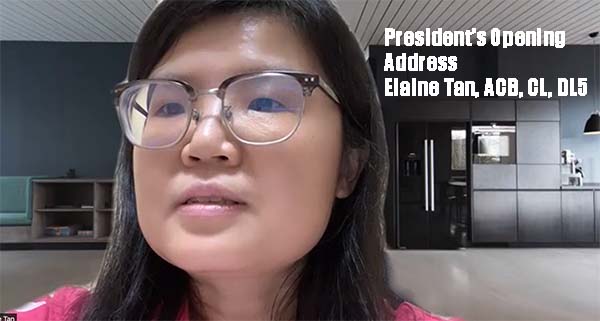
She urged everyone to make time for our monthly chapter meeting no matter how busy we might be, so that we could continue to grow to become better listeners, better speakers and better leaders.
Elaine believed that each one at the meeting are masters of our time and had never lost sight of our priorities in life. Elaine drew the example of how we had managed to pursue our hobby of public speaking despite the inconvenience thrown at us during this pandemic amidst the difficulties and disasters that had occurred along the way. She urged everyone not to stop delivering our projects and be prepared to participate in our forthcoming speech contests in the next few months.
Table Topics
The chapter meeting proceeded with our Table Topics session. The Table Topic Master of this chapter meeting is Alvin Ho, DTM. The selected topics were:
- Stay Home Notice
- Flood in Germany, Belgium and China
- Trace Together
- Food Delivery, Take-Away, Dine-in or Home Cooking?
Stay Home Notice
Speaker: Elaine Tan, ACB, CL, DL5
Elaine shared about her experience of Stay Home Notice which she experienced indirectly from her mother. Elaine’s mother had a slight fever sometime back and were then required to take a test as to whether she had contracted the coronavirus.
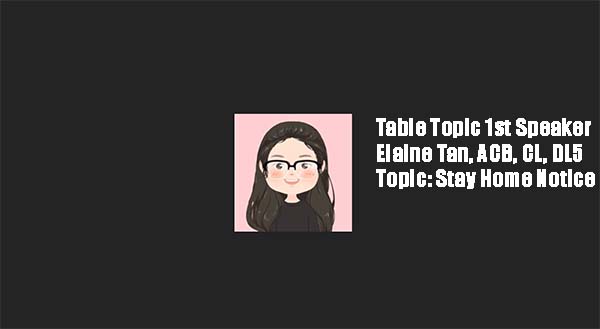
During which, her mother was required to stay home for 7 days while awaiting for the result of her test. During those 7 days, her mother was not allowed to leave her home. Upon getting caught for failing to do so, she would have to stand in court and sentenced to jail or issued a fine or both.
Fortunately for Elaine’s mother, she received her test results within two days and was tested negative. Elaine concluded her speech by urging everyone to stay home faithfully if we were issued with stay home notice to protect not only ourselves but others also.
Alvin our Table Topic Master came up with this topic after reading the incident of 2 persons were quarantined in the same hotel were caught in the same room when they were forbidden to. To date, these 2 persons have been handed down their sentence.
Flood in Germany, Belgium and China
Speaker: Yoong Ee Chuan, ACB, CL, MS2
Ee Chuan reflected on the online media that he had watched pertaining to the flood and came up with the realisation that the flood was attributed mainly to the climate change. In turn, this climate change has been attributed to the way we have been living our lives; the energy we used, the wastes we generated, and our failure to manage the world resources in a sustainable manner.
Ee Chuan added that even Singapore was not spared the flooding incident looking back a few years ago which the Singapore government called it a once in 50 years incident. Ee Chuan then concluded that what had been happening around the world were also happening locally. Therefore, perhaps we should reflect on how we would want to live our lives.
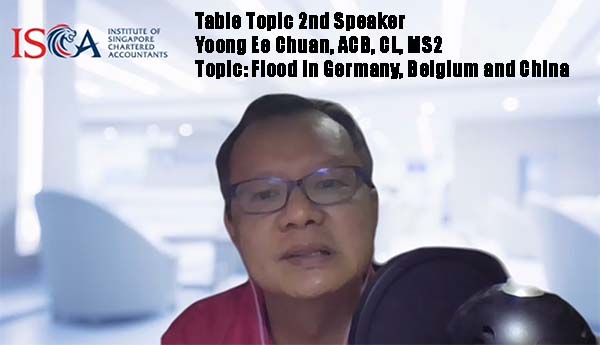
May I add that even recently, we have been experiencing locally heavy rainfall and flash flood too and not just a few years ago.
At the end of Ee Chuan’s speech, Alvin our Table Topic Master advised us on how to win in a Table Topic Speech Contest. Alvin was awaiting for someone to challenge what the media has reported and what people commonly believed. He said that normally judges would award the championship to the person who speaks in that manner.
Trace Together
Speaker: Avinash Narasimhan, PM1
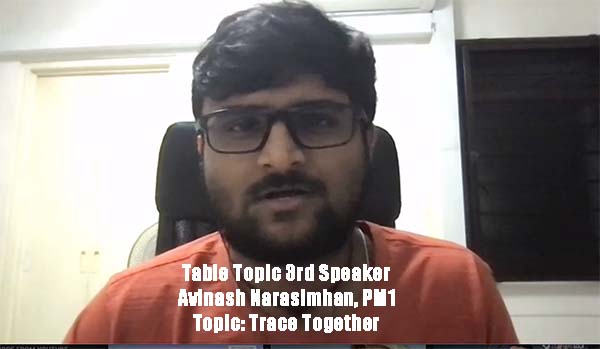
Avinash brought to our remembrance during the period where Singapore returned to Phase 2 of our Heightened Alert as of 20 July 2021, someone on board a cruise was infected with the coronavirus. As a result, the cruise was held back. The icing on the cake was the fact that Avinash himself was on board that cruise.
Avinash went on to elaborate on the purpose of Trace Together, which we already know, was to keep track of people who were in close proximity with infected people. Avinash then showered praises on our Singapore government for having a great initiative and the great job that they had been doing.
Food Delivery, Take-Away, Dine-in or Home Cooking?
Speaker: Kyle Chen, PM2
Kyle said that he had been working from home during this COVID-19 period and thus, he had been ordering food delivery. As a result, he had been eating the same food for a month. In trying to break away from ending up eating the same food over and over again, his friend gave him some advice where they ordered some food together and also had the menu delivered to them as well.
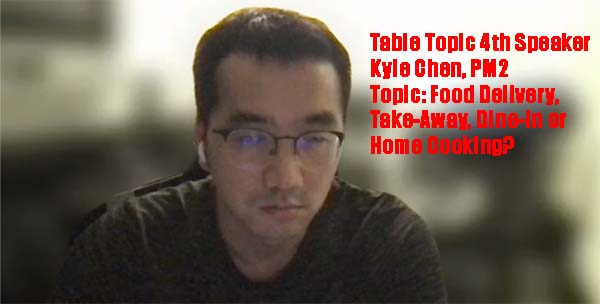
From this new experience, Kyle found that some of the new food he tried tasted as good as home cooked food.
Kyle is currently juggling with his work and his part time study. He has been taking a break from attending meetings. It is great to see you again Kyle and have you participating in our meeting. We missed you.
Also, you could have your newly wed wife prepare delicious home cooked meal for you as well if you are bored with eating the same food over and over again.
Prepared Speeches
1st Speaker: Elaine Tan, ACB, CL, DL5
Pathway Project: Motivational Strategies, Level 1, Project 2, Evaluation & Feedback (1st Speech)
Title: Why Am I So Happy
Evaluator: Wekie Tay, DTM
The Toastmaster of the Evening introduced Elaine as a “happy go lucky” person who loves to eat and tried out new thing. She hopes to bring fun and laughter to everyone around her.
Elaine began her speech by telling us that ever since she was as young as 5 years old, everyone in her neighbourhood knew that she was a very happy girl. Whenever she saw an empty can on the floor, she would react as excited as a dog and ran towards the can. She would then kick it as if it was a football and played with it happily. Elaine is always full of joy and be on top of the world in everything and anything that she is doing.
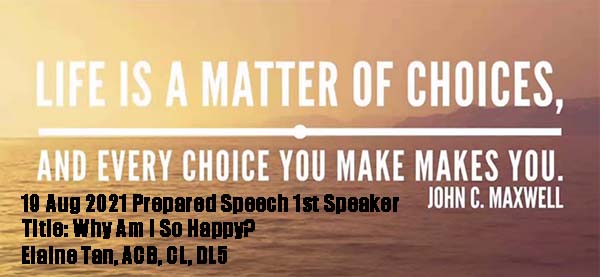
At this point, Elaine sidetracked from her speech to carry out an online survey with us, the audience. She asked us 3 questions:
- Why do you think that I am so happy?
- How many of you are happy, sad or depressed?
- Why are you in this state of emotion?
- What are the causes of your unhappiness?
As we responded to each of her questions in her survey, Elaine continued to deliver her speech in respond to our answers accordingly as follows:
Elaine told us that she was not a happy girl because she had been blessed with lots of money, nor was she born with many talents. Neither does she possess anything that people believe that will bring happiness. She is happy because she chooses to be so. Elaine believes that happiness is a choice. She invites anyone to join her in her journey to become a happy person. Even after she has become an adult, she still believes that life can be as simple as it can be.
Elaine acknowledged that life is complicated and is full of ups and downs. Many times, things are beyond our control. However, there are things that are within our choices. She asked us to step outside of ourselves and choose how we want to feel. Elaine used herself as an illustration to elaborate her point.
Back in school while other people felt unhappy even when they had scored 70% and above for their tests, In contrast, Elaine was in Seventh Heaven when she had obtained only 50% for her tests. It was not because Elaine did not have any expectations of herself. It was because Elaine understood that she could always celebrate under any circumstances. She accepted her state and position but yet knew that she was always able to improve. She need not get upset over whatever that is only temporary.
Elaine concluded by sharing with us 3 tips on how to be happy.
- Accept where you are in life and expect the most out of it everyday. There is no need to compare yourself with others. Don’t be too harsh with yourself if you do not achieve your targets. So long as you are alive, there are always time and opportunities for you to improve. As long as you have this attitude, you will not remain sad for very long despite having setbacks and failures.
- “Yesterday is history, tomorrow is a mystery, today is a gift.” – Kung Fu Panda. That is why today is called the “Present”. People who are unhappy are either digging in the past or digging for the future. They have never treasured what is happening today. They neither seize the day nor spend time with their loved ones.
- Life is a matter of choice. As long as we choose to be happy, we can be happy.
2nd Speaker: Triggi Chan, CC, IP1
Pathway Project: Innovative Planning, Level 2, Project 1, Understanding Your Leadership Style
Title: My Leadership Style
Evaluator: George Chew, DL2
Triggi began by telling us that leaders are not only exclusively the prominent world-class politicians like Late Mr Lee Kuan Yew, nor billionaire entrepreneur like Elon Musk, but leaders are also ordinary people like us who are required to fill in simple roles as project leader in school or at work. For parents, they are naturally leaders as the head of a family. These leadership roles that we play may last a short while or for a long time.
Triggi went on to tell us that leadership is not a mere position, but an action to call upon others to organise, to provide guidance and inspire others towards a unified goal. She then told us the aim of her project was to talk about her leadership style and its impact, and also share about the aspects in contrast to different styles.
Triggi listed down for us the 8 leadership styles outlined in the Toastmasters Pathway Guide.
They are:
- bureaucratic
- authoritative
- innovative
- pacesetting
- democratic
- affiliative
- coaching
- altruistic
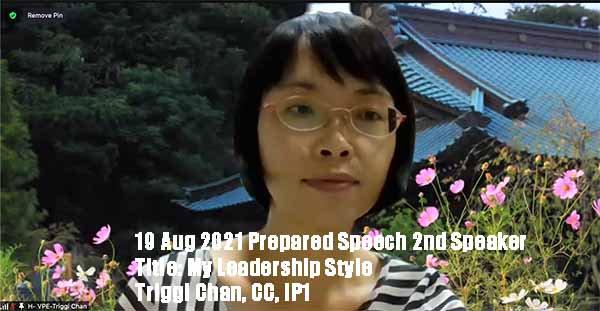
The leadership style self-evaluation exercise that Triggi did prior to preparing this speech indicated to Triggi that she is a democratic leader.
As a democratic leader, she takes a collaborative approach to people daily. Democratic leaders get feedback and shape their decisions based on responses. Thus, they tend to be good at picking brains of experts and of those they lead. They also possess traits like honesty, intelligence, creativity and fairness. Those traits are conducive for making a cohesive and well-bonded team which are the hallmark of a good democratic leaders.
However, Triggi felt that this style is not optimal when you are working with people that do not have the required expertise on the task at hand. For instance, you are put in charge of a team working on a neighbourhood event where people you work with are one-time-off volunteer or people who has no intention to learn how to manage future similar events. This is where judgment comes in where switching to other leadership styles is necessary.
Hence, Triggi opined that even if you are a democratic leader, it will be good to just adopt more autocratic approach to communicate your goals clearly. Give good direct instructions to what this person is supposed to do. On the other hand, if you oversee a cross-departmental task force in your company and you are working with people in their various expert domains of specialised knowledge that you likely do not have, then the democratic leadership should arise and ensure that every team player has the opportunity to shine and encourage them to share their expertise.
The other complementary leadership traits that Triggi said that she has are affiliative and coaching style. Affiliative leadership strives to create a cohesive team that understands the emotional needs of individuals and thus maximising teamwork and harmony. Coaching style, as the name implies, helps members realise their full potential by monitoring them, giving them advice on the goal and building their skill set for the long term. Triggi believes that different situations require different styles of leadership. Triggi told us that we can gain more experience to understand ourselves better.
In using a mixture of leadership styles from the leadership traits that you possess, Triggi believes that you can gain more experience in order to understand yourself better. By applying these leadership traits frequently, you can avoid the inherent pitfalls in these leadership traits. A leader should take ownership In the problems of the tasks they undertook and the shortfalls in their own leadership traits. Triggi gave us an illustration of the democratic style, that she perceived to be inappropriate for community work when some team members do have the right expertise for the task at hand. Triggi said that the democratic leader should not blame everyone when things do not work out, even though the task was carried out by following to everybody’s thought and idea. That is the mental crutch that democratic leaders should avoid.
Considering the affiliative style, Triggi said that it does not work as well when members are afraid to break the peace or give negative feedback. We should take that into account when you are using it on a relatively new formed team or when the environment is not conducive.
In conclusion, Triggi said that no matter what a person’s leadership style is, a leader should always set a good example for their followers by being their best. It is said that great leaders do not create followers but great leaders create more leaders when they inspire. No matter what style you adopt, be the best you can be.
3rd Speaker: Yoong Ee Chuan, ACB, CL, MS2
Pathway Project: Motivational Strategies, Level 3 Project 1, Understanding Emotional Intelligence
Title: Feel, Think & Act
Evaluator: Annabelle Yong, DTM
Ee Chuan began by telling us that both IQ (Intelligence Quotient) and EQ (Emotional Quotient) are both important. Sharing from a journal of his emotions that he has been keeping, he wished to discuss with us his experience of how his emotions have impacted the relationships with other people as well as how other people’s emotions have impacted him.
Ee Chuan shared with us that during the last two weeks, he had been going through ups and downs. He discovered that his emotions were affected by three elements – people, places, and things. One of the things that trigger all sorts of emotions are of interactions with other people. To people that he like, he tended to react positively, such as smiling. To people he disliked, he would tend to frown or project a very neutral face.
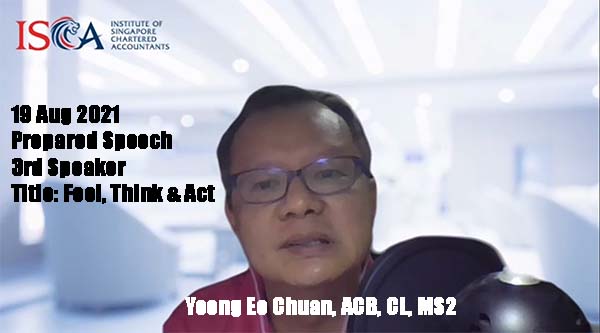
Ee Chuan shared with us about his interaction with his daughter. While they are spending time together chatting, eating their meals, travelling together to school, they were both happy and enjoyed their interaction with each other. However, when his daughter tried to talk to him while he was busy on his phone, she got irritated as he was not paying attention to her.
During virtual meetings while working from home, he would feel more easily irritated and unhappy when dealing with colleagues from other departments, especially when they are dealing with matters that they had no expertise in. On the contrary when he worked with his own team that he had trained and developed personally, he would feel happy and relaxed because he trusted them and knew their strengths and abilities.
Besides people, there are also places that affected his emotions. Having worked from home for a period during this pandemic, he did not enjoy having to return to office more often when stricter restrictions were gradually lifted. Ee Chuan felt like he was forced to return to the office when he could actually do his work at home and that caused him to feel unhappy.
The 3rd element affecting his emotions are situations. Ee Chuan’s current residence is a very old maisonette with upstairs and downstairs. So sometimes when he went downstairs and realised that he had forgotten to bring something like his face masks before he went out, he would get very angry and irritated at his own forgetfulness.
So the things that has been affecting his emotions are:
- People
- Places
- Situations
Ee Chuan concluded his speech by telling us that this exercise has helped him to develop greater awareness that the way we all feel and think. In turn, how we think will affect how we act in the way we see and how we deal with other people. So Ee Chuan felt that this project had helped him to be more observant and be in touch with how he felt. He encouraged everyone to take a step back from time to time and observe how we feel. As being more observant about our feelings, it helps us to understand ourselves much better.
4th Speaker: Woei Tyng
Pathway Project: , Visionary Communication, Level 1, Project 1, Ice Breaker
Title: Self Introduction
Evaluator: Triggi Chan, CC, IP1
Woei Tyng began by telling us that she did not prepare for her speech. She just wanted to get herself familiarised with Toastmasters for the first time by observing the meeting, and speak naturally the way that she usually would. She had also noticed that everyone had prepared themselves and spoken very well.
Woei Tyng told us that her decision to join Toastmasters was under the inspiration and influence of Bizon, Telok Blangah Toastmasters Club Immediate Past President. They have been friends for a few years and they went hiking together regularly. So Bizon had brought up the topic of Toastmasters to her and she decided to come on board.
Woei Tyng is a Malaysian who has been living in Singapore for 8 years. Currently she is a yoga instructor. As a yoga instructor, she does not conduct studio teaching but instead she focuses on teaching one-to-one or only to a maximum of 4 students at a go. She felt that in that way, she could personalise and customise her teachings to give the greatest benefits to her students.
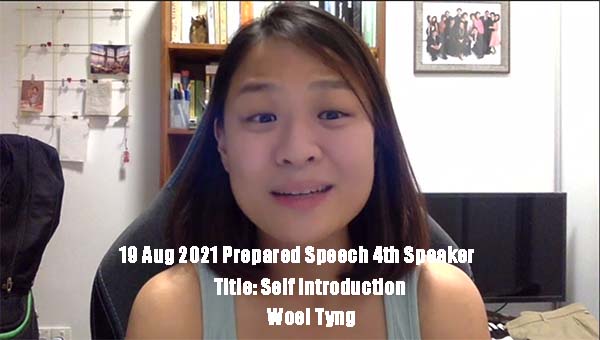
Prior to teaching yoga, Woei Tyng had been working in the Information Technology industry for 12 years. Before the COVID-19 pandemic hit, she left her job in an IT firm to take a break from her career.
So Woei Tyng, I would liken you to a full-time MOE school teacher resigning from her teaching job to give private tuition instead so that you can have more personal time for yourself. The exception is that an ex-teacher is still using the same skill from her previous job to continue making a living, whereas you are using your personal knowledge of yoga that you have from your hobby.
Moving on from her job to her hobby, Woei Tyng told us that she loves to travel. Ever since she was a teenager, she has been travelling to many countries. Before the pandemic, she would travel overseas almost at the frequency of every other week. She liked to have a short get-away from Singapore over the weekend. Woei Tyng likes to experience life, different culture and food in different places. When she travels, she likes to stay for 2 to 3 weeks living like a local in a small town, talking to the locals and enjoy the food like a local.
She has even been to India thrice. Woei Tyng was aware of the danger lurking around while touring in India. She took precautionary measures in making arrangements with the school and stayed within the school compound. (The mention of school, it sounds to me like you did this either during junior college years or as an undergraduate during your varsity years.)
Woei Tyng laughed over her act of bravado, remarking that she was still young then, and was brave, adventurous, free spirited and unworried. Being more mature now, she will be more careful with what she is doing. Woei Tyng closed the chapter on her love for travelling by telling us that that was a big part of her life before she got married.
So she transited from her love for travelling to the current aspect of her married life. Woei Tyng brought us round to a full circle to the beginning where she told us about herself where she quit her IT job to take a break from her career. She actually took a break from her career to prepare for her wedding. In fact, she was supposed to have two weddings, a wedding in Singapore and another in New Zealand. The wedding in New Zealand was meant just for her close friends and herself to have a travel trip together.
So I was not very sure whether did the two weddings go as planned and were the plan affected by the pandemic. Maybe Woei Tyng could clarify on that with us in future. So for now, Woei Tyng did not return to her corporate life in the IT industry. She found that the pandemic has domesticated her. Having to stay home, she picked up things like cooking, reading, and yes, even Toastmasters.
It was at this point that Woei Tyng told us that she had always wanted to join Toastmasters for a long time. Nevertheless, she was travelling so often that she did not have the time to commit herself to the toastmasters journey. This pandemic situation has offered her the opportunity to stay put and commit herself to come on board to Toastmasters.
True to the spirit of a yoga instructor, Woei Tyng could not resist the urge to lead us into some stretching exercises before concluding her speech.
Well done, Woei Tyng. Despite the fact that this is an unprepared impromptu speech, I found that you have spoken very well and the delivery was very smooth and you certainly did not exhibit any fear in public speaking. You have shown to have very great potential in public speaking. If you have taken time to write down your script, polish it and rehearse it, you could have delivered it professionally and reduce your pause fillers (which weren’t many anyway) as well. Looking forward to your next speech.
5th Speaker: Jane Pang, CC, CL, VC2
Pathway Project: Motivational Strategies, Level 3, Project 1, Creating Effective Visual Aids
Title: How To Love Your Job
Evaluator: Yoong Ee Chuan, ACB, CL, MS2
Jane began by first telling us that many people are not working at a job that they are skilful at nor passionate about. Jane believed that if your job matches your passion and skills, you will be happy.
(Actually, I beg to differ. Ideally, we all wish to be working at a job we are passionate about. Better still, when we possess the right skills to excel at our job as well. Nevertheless, after working for decades at the same job, I have realised that you can never be happy in a position of being paid to do a job. You are paid to do what others want you to do, not what you want to do. Only when you have financial freedom, then you can do what you enjoy and what you wish to achieve, and not doing what others who are paying to do.)
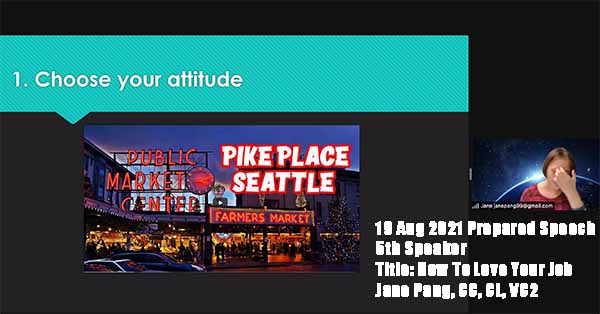
Jane continued to tell us that if we do not love our jobs, we cannot give a hundred percent of our effort. We also experience boredom at our jobs. Subsequently we do not display positive attitude at our work.
At this point, Jane wanted to give us a few pointers on how to love our job.
She then played us a video of fishmongers enjoying themselves throwing fishes back and forth to each other in Washington’s fish market. The lesson Jane was trying to convey to us from the video is to play, have fun at your work. It will lift your spirit.
Jane then shared with us a daily prayer to recite every morning:
“Just for today I will let go of my anger.
Today I will let go of worry.
Today I will call my many blessings.
Today I do my work honestly.
Today I will be kind to everyone.”
Jane believed that by reciting this prayer, we will carry with us a positive energy to the people around us.
Next, Jane asked us to stay in the PRESENT, do not dwell in the past, and do not dream of the future, but just concentrate our mind on the PRESENT. Be at the present so we do not have to focus on the tasks in the future. Just focus on the job that is at hand. Multitasking can make us stressful. Multitasking could prove to be counterproductive instead of productive.
Decide to bless just one person each day. It is impossible to please everyone and that will stress you out if you attempt to do so. So just choose one person. Go the extra mile to cheer a particular person up, brighten up his day by smiling to that person or buy that person a cup of coffee. Human beings tend to feel positive when they bless somebody.
Jane summed up her speech by telling us to:
- Inject fun and games at your workplace. Inject energy into your team of workers.
- Chose our attitude. Be positive.
- Focus on the current situation.
- Bless someone.
Best Speakers
Best Evaluator
Wekie Tay, DTM
Best Speaker (Prepared speech)
Yoong Ee Chuan, ACB, CL, MS2
Best Table Topic Speaker
Yoong Ee Chuan, ACB, CL, MS2
President’s Closing Address
The President’s Closing Address was delivered by Avinash Narasimhan, PM1, President of Telok Blangah Toastmasters Club.
Avinash began by saying that it is our inner selves that are projected on our outward selves. It is by having a calm and composed self that we are able to perceive the world more positively. He thanked the speakers for sharing positive things in that speech and went on to summarised what Elaine, Ee Chuan and Jane had delivered in their prepared speech and thanked Woei Tyng for the little exercises towards the end of her Ice Breaker speech.
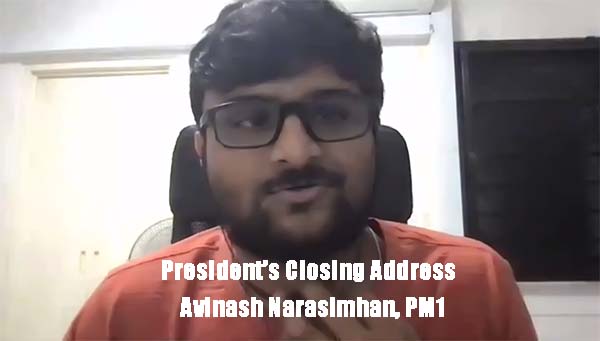
Visitors:
George Chew, DL2, Area Z2 Director, Choa Chu Kang Toastmasters Club
Owen Ter, PM, EH3, Area B2 Director, Kebun Baru Toastmasters Club
Alvin Ho, DTM, Kebun Baru Toastmasters Club
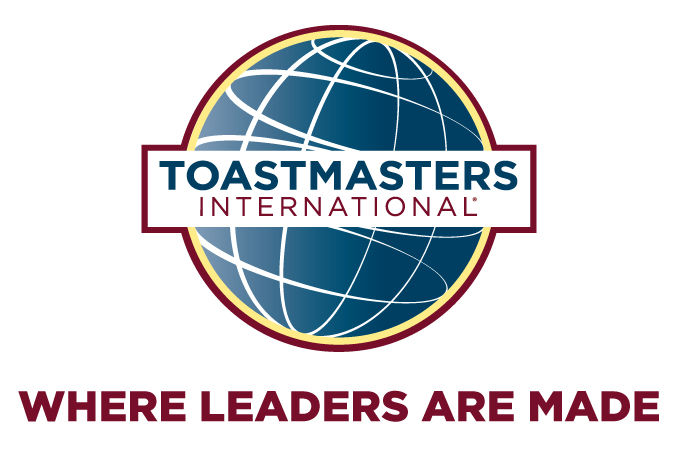
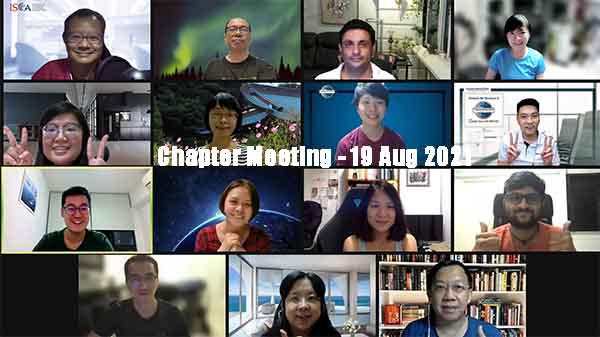




0 Comments